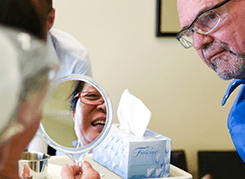Dental Bone Grafting Brisbane
- Create more support for your dental implants by transplanting new bone into your jawbone
- Safe dental bone graft procedure performed by our experienced maxillofacial surgeon
- The grafted section can be made of your own bone or a synthetic material
What is a Bone Graft?
If you are considering dental implants, it’s important to have healthy gums and adequate bone structure to support them. Without it, you may not have a suitable base for your dental implants. In such cases, you may require bone grafts for dental implants to create the right foundation.
Brisbane Dental Implant Group’s maxillofacial surgeon, Dr Ed Hsu, can perform bone grafts to create optimum support for your dental implants. Once your bone graft has fully healed and new bone was developed around it, our implant specialist Dr Michael Howard can place your dental implant safely without issues.
Call (07) 3244 2400 or BOOK AN APPOINTMENT to find out more about getting a bone graft surgery in Brisbane for dental implants.
What is dental bone grafting?
Bone grafting for dental implants is a procedure that inserts new bone into your jawbone to provide adequate support for dental implants.
Bone grafting for tooth implant is essentially a transplant of the bone tissue, replacing insufficient or missing bone to rebuild unhealthy or diseased bone. The tissue used for bone grafts can come from your own body or a special synthetic material. If your body ‘takes’ to the bone graft, the bone can grow into new, living bone.
Sometimes, a sinus lift may also be required, especially if you need dental implants on your upper jawbone. Dr Hsu can perform both a bone graft and sinus lift (if necessary) to make sure your dental implants can be installed safely.
The Dental Implant Bone Graft Procedure
- Determine the material. You and our surgeon will decide what material to graft into your jawbone. This material can either be a piece of bone from another part of your body or a synthetic bone grafting material.
- Bone graft surgery. Our surgeon takes the bone graft and surgically transplants it into your jawbone.
- Heal. Allow time to recover from your surgery. This initial recovery can typically last for a few weeks.
- Build new bone. As your body adapts to the transplanted bone, it will create new solid bone. This build-up of new bone can take anywhere between a few to several months.
- Proceed with dental implants. Once your jawbone is strong enough with its new bone, you can proceed with your dental implant surgery. Implants can typically be placed four to nine months after the procedure.
Why bone grafts for dental implants are needed
When you lose a tooth, the bone directly underneath your missing tooth has nothing to push against. This causes that bone to weaken and deteriorate. When this happens, it will not be strong enough to hold your new dental implants in place properly. This is also the case if the jawbone where your dental implants will be is too soft or too thin. Without a solid base on your jaw, your new dental implants will likely fail and function poorly.
A bone graft helps strengthen this part of your jawbone, providing the support your dental implants need to stay in place and function properly.
Is bone grafting always required for dental implants?
No, not always. A bone graft is only needed if you don’t have enough bone in your jaw to support dental implants. This often happens when the bone supporting your tooth weakens due to:
- Tooth removal
- Tooth loss due to an injury
- Gum disease or infection
- Severe tooth cavities
Before performing any dental implant surgery, Dr Howard and Dr Hsu will assess your jaw structure to make sure you have enough support for your dental implants. If you need additional support in your jaw, Dr. Hsu will determine your best solution for bone grafting or a sinus lift. We will discuss your available options and help you decide the best solution to get the results you want.
How long will it take to heal?
The entire healing process following a bone graft usually takes a couple of months.
For the next few weeks after your surgery, you may experience some swelling, bleeding and discomfort on the treated area. This will eventually disappear as your body heals. You will then need to give your body enough time to produce new bone from your bone graft.
The specifics of your procedure will depend on your unique circumstances. Dr Hsu can assess your needs and ensure your bone graft has the best chance to be accepted by your body.
Are there any risks?
Like any surgical procedure, bone grafts carry some risks. Some of the risks of bone graft surgery include infection, blood clots, and nerve damage. There is also the risk of the grafted bone not being “taken” or adopted by your body.
Bone grafts for dental implants, however, have a high success rate, especially when performed by an experienced maxillofacial surgeon like Dr Hsu.
Book an appointment today
If you need bone grafts in Brisbane for dental implants, or if you want to find out more about bone graft surgery, please contact us to book a consultation. We have one of the most trusted specialists for bone grafting in Brisbane who can help you get the most comfortable and best-functioning dental implants possible.




